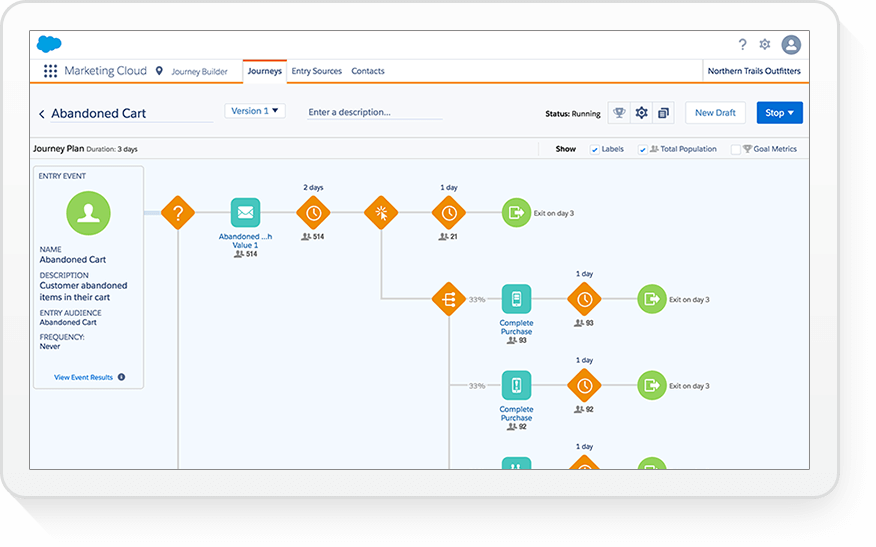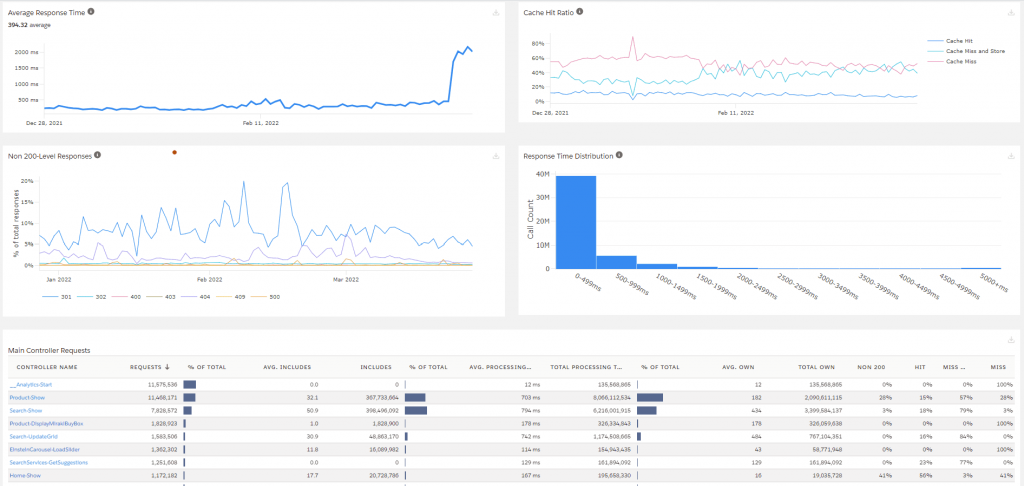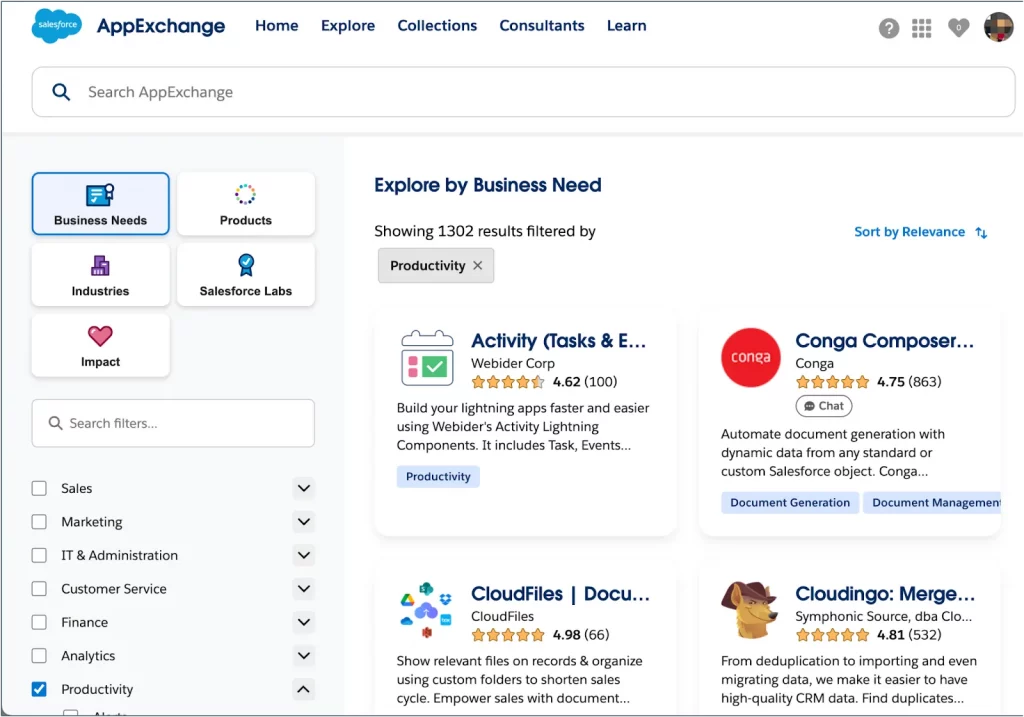Salesforce Commerce Cloud transforms how businesses manage their digital commerce. This unified platform connects e-commerce, physical points of sale, and order management within a single system.
What is Salesforce Commerce Cloud?
Salesforce Commerce Cloud, now known as Agentforce Commerce, represents a comprehensive digital commerce solution. The platform enables businesses to create and manage personalized shopping experiences across all channels.
The solution leverages Agentforce’s artificial intelligence to automate business processes. Marketing teams utilize this technology for intelligent merchandising. Customers benefit from personalized support throughout their purchasing journey.
Commerce Cloud boasts a historical availability of 99.99%. This reliability enables businesses to serve over two billion buyers worldwide. Major brands such as L’Oréal, Humana, and Sonos trust this infrastructure for their digital operations.

Key Components of Commerce Cloud
B2c Commerce: Optimized Customer Experience
B2C Commerce manages the complete customer journey, from product discovery to checkout. The platform utilizes AI to personalize every interaction. Businesses increase their revenue through intelligent recommendations and tailored experiences.
The system analyzes purchasing behavior in real-time. This data enables the offering of relevant products at the opportune moment. Conversion rates naturally improve thanks to this personalized approach.
B2b Commerce: Simplified Complex Sales
B2B Commerce addresses the specific needs of business-to-business transactions. The platform manages complex catalogs, negotiated prices, and multi-level approval processes.
Professional buyers experience a self-service interface similar to B2C. B2B-specific functionalities remain available: volume orders, personalized quotes, and multi-user accounts. Workflow automation accelerates sales cycles.
Order Management: Unified Omnichannel Management
Order Management centralizes order processing, regardless of the purchase channel. The system synchronizes inventory in real-time across all points of sale. Orders are automatically routed to the optimal distribution point.
This unified approach reduces operational costs. Businesses avoid stockouts and missed sales. Customer satisfaction increases due to optimized delivery times.
Measurable Benefits of Commerce Cloud
Businesses utilizing Commerce Cloud observe tangible results. Salesforce data indicates an average increase of 29% in digital revenue. Processes automate 27% faster than with traditional solutions.
During Cyber Week 2022, sales on Commerce Cloud increased by 11%. The sector as a whole registered only a 2% growth. This disparity illustrates the platform’s effectiveness during periods of high demand.
Ownership costs decrease thanks to the unified architecture. Businesses eliminate complex integrations between separate systems. Technical teams focus on innovation rather than maintenance.

Artificial Intelligence at the Core of the System
Agentforce: the Integrated AI Assistant
Agentforce transforms conversations into conversions. AI guides customers in their product search. Visual search enables the discovery of similar items by uploading an image.
The system analyzes the complete product catalog during conversations. Contextual responses enhance the customer experience. Conversion rates increase thanks to these personalized interactions.
Intelligent Recommendations and Automated Merchandising
AI analyzes behavioral data to predict purchasing preferences. Product recommendations adapt in real-time according to the browsing context. Merchandising automatically optimizes based on observed performance.
Marketing teams save time on repetitive tasks. Automation enables rapid testing of various strategies. Results continuously improve through machine learning.
Composable Commerce and Headless Architecture
Commerce Cloud offers a composable architecture to maximize flexibility. Businesses construct personalized storefronts while maintaining a robust backend. This headless approach accelerates the time-to-market for new functionalities.
Developers utilize APIs to connect various systems. Innovation becomes faster without compromising stability. Brands create unique experiences while benefiting from Salesforce reliability.
The PWA Kit facilitates the development of progressive applications. Websites offer performance comparable to native applications. The user experience remains optimal across all devices.
For businesses seeking to transition to a simpler-to-maintain environment, Salesforce to Shopify migration services are available. These services enable the transfer of products, customers, and order histories while mitigating the risk of site interruption, which assists in calmly comparing both ecosystems before a definitive change.
Integration with the Salesforce Ecosystem
Native Connection with CRM
Commerce Cloud integrates natively with Salesforce CRM. Customer data flows freely between systems. Sales and marketing teams share a unified view of the customer.
This integration eliminates data silos. Marketing campaigns achieve better targeting through sales data. Customer service accesses the complete interaction history.
AppExchange: Extending Capabilities
AppExchange offers over 3,000 compatible applications. Businesses can easily add new functionalities. Pre-built integrations reduce deployment times.
Third-party solutions cover all requirements: payments, logistics, marketing automation. Businesses construct their ideal technology stack. Guaranteed compatibility simplifies integration projects.

Points of Sale and Unified Commerce
The modern point of sale connects physical stores to the digital system. Sales associates access customer data and global inventory from their tablet. Transactions can be completed anywhere within the store.
Endless Aisle enables the sale of products not available in-store. Customers can order from the store for home delivery. Lost sales are eliminated thanks to access to global inventory.
Unified inventory management optimizes distribution. Web orders can be prepared in-store. Click-and-collect is easily organized thanks to real-time visibility.
Payment Management and Security
Integrated and Flexible Payments
Commerce Cloud natively integrates payment solutions. Transactions are securely processed on the platform. Businesses can easily configure accepted payment methods.
The checkout experience remains fluid and optimized. Abandonment rates decrease thanks to a simplified process. PCI-DSS compliance is guaranteed by the Salesforce infrastructure.
Revenue Lifecycle Management for B2b
Revenue Lifecycle Management automates B2B financial operations. Quotes are automatically generated according to business rules. Contracts follow predefined approval workflows.
AI accelerates the conclusion of complex deals. Sales teams focus on customer relationships. Pricing errors are eliminated thanks to automation.
Analyst Recognition and Market Positioning
Gartner has named Salesforce a leader in digital commerce for 10 years. The 2025 Magic Quadrant confirms this dominant position. The comprehensive vision and continuous innovation explain this ranking.
IDC MarketScape recognizes Salesforce as a leader in B2C commerce. The evaluation highlights market knowledge and AI capabilities. Developer support represents a major competitive advantage.
Quadrant Knowledge Solutions ranks Salesforce at the top of the SPARK Matrix 2024. Technological excellence and customer impact justify this position. Businesses choose Commerce Cloud for its maturity and continuous evolution.
Starter Suite: Entry into the Commerce Ecosystem
Starter Suite enables SMEs to quickly launch their e-commerce operations. The solution combines commerce, marketing, sales, and customer service. Essential functionalities remain accessible within a simplified interface.
Businesses can quickly launch their direct-to-consumer store. Unified data enhances the experience across all channels. Growth is easily accommodated with the available evolution options.
Training and Available Resources
Trailhead: Free and Guided Learning
Trailhead offers free modules to master Commerce Cloud. Learning paths cover all aspects of the platform. Certifications validate acquired skills.
Practical modules include Guided Shopping, PWA Kit, and Commerce Cloud fundamentals. Developers learn to create high-performance headless experiences. Marketers discover conversion optimization with AI.
Professional Support and Guidance
Salesforce CTOs support complex projects. These experienced advisors guide architectural choices. Industry-specific expertise ensures solutions tailored to each industry.
The Commerce newsletter disseminates the latest product innovations. Industry studies provide insights into market trends. Customer feedback inspires new implementations.
Salesforce Commerce Cloud FAQ
1. How can I determine if Salesforce Commerce Cloud is suitable for my business?
Commerce Cloud is suitable if you manage multiple sales channels, if your catalog frequently evolves, or if you wish to centralize your customer data. Businesses requiring advanced personalization or a platform capable of managing traffic peaks generally find significant benefits.
2. What is the difference between Commerce Cloud and an open-source solution?
An open-source solution requires a dedicated technical team for updates, security, and hosting. Commerce Cloud externalizes all of this. This is beneficial if you aim to reduce internal maintenance or accelerate deployment without managing the infrastructure.
3. Can Commerce Cloud be connected to existing business tools?
Yes. The platform integrates seamlessly with modern ERP, PIM, DAM, and marketing tools. APIs enable you to retain your current processes while incorporating advanced e-commerce capabilities. Most integrations can be achieved without a complete overhaul.
4. Is Commerce Cloud relevant for an advanced omnichannel strategy?
Yes, particularly if you aim to unify the experience across your stores, website, and customer service. The platform maintains synchronized data, which prevents experience disruptions and facilitates uses such as click-and-collect or in-store advice based on purchase history.
5. What level of expertise is required to leverage Commerce Cloud?
You do not need to be a developer to manage merchandising, promotions, or customer journeys. However, more advanced projects such as headless storefronts, API integrations, or extensive customizations often necessitate a specialized partner or a trained internal team.
Perspectives and Future Evolution
Commerce Cloud continues to evolve with market demands. Generative AI is already transforming business interactions. Conversational capabilities are constantly being enhanced.
The convergence between physical and digital commerce is accelerating. Businesses are adopting truly omnichannel strategies. Commerce Cloud remains central to this digital transformation.
Investments in R&D ensure continuous innovation. Customers automatically benefit from new functionalities. The platform adapts to future technological and business changes.



